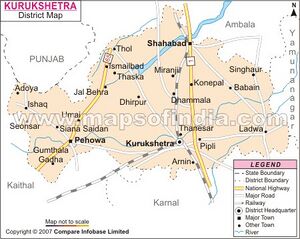Abhimanyupur
| Author:Laxman Burdak, IFS (Retd.) |
- For Gotra see - Amin

Amin (अमीन) Village is located at a distance of about 8 kilometers from Kurukshetra in Thanesar tahsil of Kurukshetra district of Haryana.
Via a notification by Haryana Government, its name has been changed as Abhimanyupur (अभिमन्युपुर)
Variants of name
- Karnavedha (कर्णवेध) दे. Amin (अमीन) (AS, p.144)
- Amin (अमीन) (हरयाणा) (AS, p.33)
Location

Amin Village is located at a distance of about 8 kilometers from Kurukshetra in south-east direction.
Origin of name
Jat gotras
History
There is a very old Shiva temple in the village and there are remains of an old fort near the village. This fort is situated at a higher level than the rest of the village. People say that this fort belonged to Abhimanyu, the son of Arjuna in the Mahabharata times. Folklore also says that the Pandavas arrayed their forces before the last battle in the War of Mahabharat at Amin. There is mound here which marks the site of 'Chakravyuha' in which Abhimanyu lost his life.
The men of Amin from the Ror community belong to Chauhan gotra and in majority cases their average height is more than six feet. There is a local saying that the Indian Volleyball team always has at least one Ror from this village. A perfect example of this village's contribution to Indian Volleyball is Arjuna Award winner Dalel Singh, who has also had the distinction of captaining the national team.
अमीन
विजयेन्द्र कुमार माथुर[3] ने लेख किया है ...अमीन (हरयाणा) (AS, p.33): अमीन पंजाब राज्य के थानेसर से लगभग 5 मील दिल्ली-अम्बाला रेलमार्ग पर कुरुक्षेत्र प्रदेश में स्थित है। कहा जाता है कि महाभारत युद्ध के समय द्रोणाचार्य ने चक्रव्यूह की रचना इसी स्थान पर की थी, और अभिमन्यु ने इसी को तोड़ते समय वीरगति प्राप्त की थी। अभिमन्यु-वध का वर्णन महाभारत द्रोण पर्व (49) में इस प्रकार से आया है- उत्तिष्ठमानं सौभद्रं गदया मूर्ध्न्यताडयत्, गदावेगेन महता व्यायामेन च मोहित:। विचेता न्यवतद् भूमौ सौभद्र: परवीरहा, एवं विनिहतों: राजन्नेको बहुभिराहवे। (महाभारत द्रोण पर्व 49, 13-14)
अमीन शब्द को अभिमन्यु के नाम से संबंधित कहा जाता है। अमीन ग्राम के निकट ही 'कर्णवेध' नामक एक खाई है। ऐसी मान्यता है कि इसी स्थान पर कर्ण को अर्जुन ने मारा था। जयद्रथ के मारे जाने का स्थान 'जयधर' भी अमीन गाँव के निकट ही है।
Visit by Xuanzang in 634 AD
Alexander Cunningham[4] writes that Five miles to the south- south-east of Thanesar there is a large and lofty mound called Amin, which is said by the Brahmans to be a contraction of Abhimanyu Khera, or the mound of Abhimanyu, the son of Arjuna. The place is also named Chakra-bhyu, or the " Arrayed army," because the Pandus hero assembled their troops before their last battle with the Kauravas. Here Abhimanyu was killed by Jayadratha, who was himself killed the next day by Arjuna. Here Aditi is said to have seated herself in ascetic abstraction to obtain a son, and here accordingly she gave birth to Suryya, or the Sun. The mound is about 2000 feet in length from north to south, and 800 feet in breadth, with a height of from 20 to 30 feet. On the top there is a small village called Amin, inhabited by Gaur Brahmans, with a temple to Aditi, and a Suryya Kund on the east, and a temple to Surrya on the west. The Suryya Kund is said to represent the spot where the Sun was born, and accordingly all women who wish for male children pay their devotions at the temple of Aditi on Sunday, and after-wards bathe in the Suraj Kund.
Notable persons
- Dalel Singh Ror - He got Arjuna Award for Volleyball. Dalel Singh is an Indian Volleyball player who was decorated with the highest sporting honor, the Arjuna Award in the year 1990. He was born in a Ror family of village Amin, which is quite close to Kurukshetra. He picked up Volleyball at the Kurukshetra University and went on to become the Captain of the Indian national team. After retirement, he went back to academia and completed his doctorate from Kurukshetra University.
External links
References
- ↑ The Ancient Geography of India: I. The Buddhist Period, Including the Campaigns of Alexander, and the Travels of Hwen-Thsang. By Sir Alexander Cunningham, p.337
- ↑ Mahipal Arya, Jat Jyoti, August 2013,p. 15
- ↑ Aitihasik Sthanavali by Vijayendra Kumar Mathur, p.33
- ↑ The Ancient Geography of India/Central India, p.337
Back to Jat Villages

